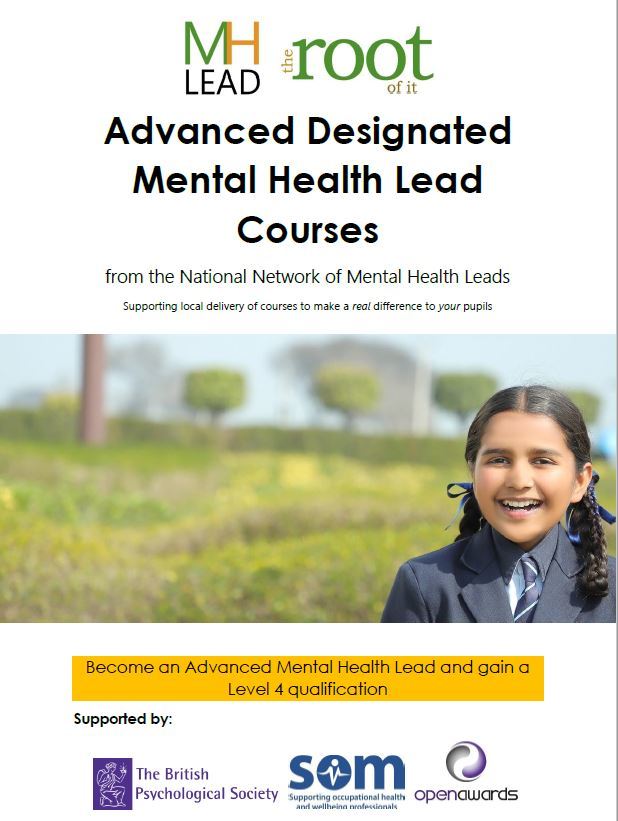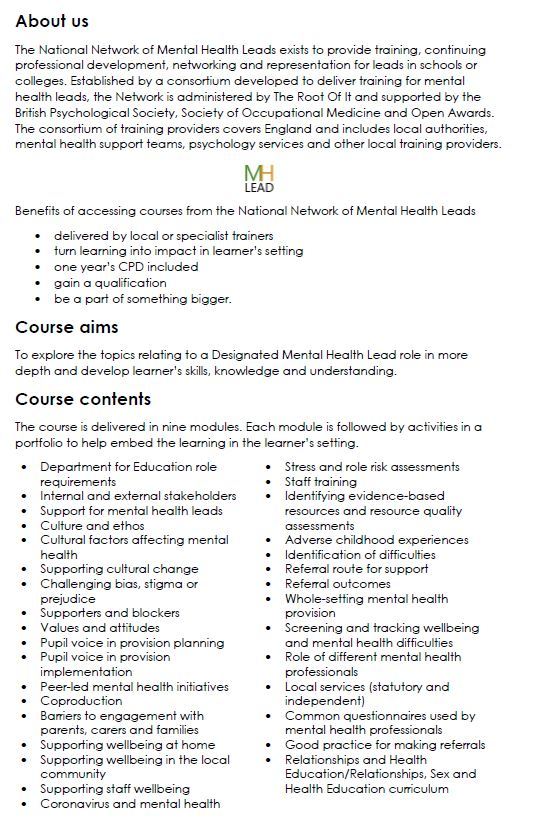
We are pleased to confirm that the Department for Education has announced a further £7m in funding available for senior mental health lead training for the remainder of the 2023-24 financial year. This means that up to two thirds of eligible settings will have the opportunity to benefit from the training by the end of this financial year.
The DfE are offering schools a grant to pay for senior mental health lead training. DfE are now allowing schools and colleges to claim a second grant if the senior mental health lead they previously trained left before embedding an effective holistic approach to mental health and wellbeing. This will help settings who’ve been impacted by staff turnover to train a new lead who can build on the progress already made.
You can find updated guidance and grant conditions for schools and colleges who apply for DfE grant funding.
The Programme Dates still available are:
- Day 1: Thur 27th June 2024 - Face to Face
Day 2: Mon 15th July 2024 - Face to Face
Day 3: Wed 25th Sept. 2024 - Face to Face
For further information please complete this form and then follow the steps below:
Register your interest in this programme by clicking below and follow the steps:
https://forms.office.com/e/GstYwL4pdX
- Complete the first stage of the application process to reserve a grant via de DfE website. In this form, your eligibility will be checked.
- You will then receive confirmation that they have successfully received your application and you should proceed to book the DfE quality assured training course via the mentalhealthlead.com website to commence by 27th June 2024.
- You will receive an email from DfE inviting you to submit the second stage of your application. In this form, you will be asked to provide evidence that confirms you have booked a DfE quality assured course. If you do not submit within the deadline provided, they may release your place to other applicants.
For any questions please contact us: TSHub@harrischaffordhundred.org.uk
DfE Fully Funded
Designated Mental Health Lead
Training Programmes
Grant funding to schools is £1200, £800 for the programme & £400 for cover costs. For more information on DfE grants you can visit:
https://mentalhealthlead.com/dfe-grant-process/
Training objectives and outcomes



For more information and to book, click below:
https://mentalhealthlead.com/
Summary
Senior mental health lead training is intended to provide individuals with the additional development they require to have the knowledge and skills to develop or introduce a positive whole school or college approach to wellbeing and mental health. The specific learning outcomes for senior leads closely align to Public Health 8 March 2021:
Mental Health Delivery Division England’s Promoting children and young people’s emotional health and wellbeing (publishing.service.gov.uk) – 'principles to promoting a whole school/college approach to emotional health and wellbeing'
Figure 1. Public Health England’s eight principles to promoting a whole school and college approach.
Senior Mental Health Leads will have oversight of the whole school approach to mental health and wellbeing, including how it is reflected in the design of behaviour policies, curriculum and pastoral support, how staff are supported with their own mental wellbeing and how pupils and parents are engaged.
This role will include the following responsibilities:
- Supporting the identification of at risk children and children exhibiting signs of mental ill health;
- Knowledge of the local mental health services and working with clear links into children and young people’s mental health services to refer children and young people into NHS services where it is appropriate to do so;
- Coordination of the mental health needs of young people within the school or college and oversight of the delivery of interventions where these are being delivered in the educational setting;
- Support to staff in contact with children with mental health needs to help raise awareness, and give all staff the confidence to work with young people; and
- Overseeing the outcomes of interventions on children and young people’s education.
This training programme will address the following eight principles:
|
Principle:
|
Leads will learn about:
|
- Leadership and management that supports and champions efforts to promote wellbeing and mental health.
|
- the benefits of a whole school or college approach, and the purpose and expectations of the senior mental health lead role.
- the factors important to lead strategic change to implement an effective whole school or college approach.
- the importance of working effectively with the senior leadership team, Governors, parents/carers and pupils, and with staff in mandatory roles such as SENCOs, Designated Safeguarding Leads, teachers and Virtual School Heads to deliver a whole school or college approach.
- how the senior lead role fits within the wider mental health system to be able to make best use of mental health support services across the NHS, their Local Authority and Voluntary and Community Sector partners.
- existing best practice in schools and colleges, and the benefits of sharing practice and experiences to sustaining an effective whole school or college approach.
- the importance of collecting and assessing data to support implementation of a whole school or college approach.
|
- Identifying need and monitoring impact of interventions. To understand and plan appropriate responses to pupils’ and students’ mental health and wellbeing needs.
|
- the impact that poor mental health and wellbeing can have on children and young people’s readiness to learn – and other indicators, such as attendance, attention, behaviour and attainment.
- the importance of measuring need across the whole school or college and monitoring the impact of interventions to measure progress and adapt approach.
- the range of mental health issues likely to be encountered in schools and colleges, and the risk factors associated with specific groups, including those who have suffered from trauma, vulnerable groups such as children who have or have had a social worker, looked-after and previously looked-after children, young carers and those identified as otherwise vulnerable, those with special educational needs and those from ethnic minority backgrounds.
- how life experiences can lead to mental health fluctuations.
- how to differentiate when the need of the child or young person would be better met by an education or health intervention, specifically in relation to SEND.
- the tools used by mental health professionals to baseline and measure outcomes of interventions.
- how they can monitor the impact of interventions in their setting.
|
- Targeted support and appropriate referrals. To ensure children and young people can get timely and appropriate support.
|
- the types of statutory and independent mental health services that commonly exist in each local area, the needs they each meet, and when they are appropriate to access as part of a whole school or college approach.
- the importance of forming strong partnerships with local services and the wider community.
- the threshold for making a referral to various services including NHS children and young people’s mental health services (CYPMHS, previously CAMHS), and the scope and limitations of what the NHS can offer.
|
- Staff development. To support their own mental wellbeing, and that of pupils and students.
|
- the importance of staff looking after their own mental health • the importance of working with staff to promote and support a positive culture of staff mental health and wellbeing.
- evidence-based approaches for supporting their own, staff and pupil or student mental health and resilience, such as trauma informed, counselling, mindfulness and other approaches, and the role these can play as part of a holistic approach.
- signposting and arranging appropriate support for staff dealing with mental health issues and incidents in the school/college.
|
- Creating an ethos and environment that promotes respect and values diversity.
|
- the importance and potential impacts of cross-cultural contexts, health inequalities, disadvantage, discrimination and vulnerabilities within the school/college community and local area and their potential relationship to, and impact on, mental health.
- how critical the relationships between staff, children and young people are in promoting wellbeing and a sense of belonging to - and liking of - school or college.
- the wider interventions that children and young people might be going through, such as contact with the justice system or social services, and how these may impact on mental health and wellbeing.
- the importance of creating an ethos and conditions that support positive behaviours for learning and for successful relationships to provide an emotionally secure and safe environment that prevents any form of bullying or violence.
|
- Enabling the Student Voice so that the voice of every learner is heard and valued, and influences decisions.
|
- the role of pupils and students in developing an inclusive whole school or college approach.
- the importance of ensuring that a range of voices are heard, which reflect the diversity of the pupil and student community.
- a range of strategies for engaging with pupils and students with different communication preferences or needs.
- how and why to feedback to students about the impact that their participation or consultation has had.
|
- Working with parents, families and carers So that everyone works as a genuine team around pupils and students, with a consistency of approach and shared aims and strategies.
|
- the importance of effective engagement with parents, families and carers in the local community, to implement an effective whole school or college approach, and to support the mental health of individual pupils and students.
- what prevents some parents, families and carers from engaging.
- how they can make their school or college feel more accessible.
- a range of strategies for successfully engaging parents, families and carers in mental health, including when relationships are difficult or a parent, carer or child is distressed.
|
- Curriculum, teaching and learning to promote resilience and support social and emotional learning.
|
- the mental health and wellbeing content in the statutory health education curriculum in schools (PSHE and RSHE programmes), and associated guidance on the safe teaching of difficult mental health issues, including the importance of close collaboration with leads for child protection/pastoral/safeguarding and SENCOs, to ensure that teaching is age and developmentally appropriate and sensitive to the needs of all pupils.
- how to integrate mental health and wellbeing into the wider curriculum to support outcomes for pupils and students.
|
For further information can be found on the Learning outcomes for senior mental health leads in schools and colleges DfE document.
If you have any questions, please email Martha Lopez: M.Lopez@harrischaffordhundred.org.uk.






